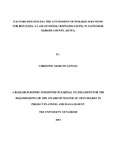| dc.contributor.author | Gituma, Christine N | |
| dc.date.accessioned | 2013-11-25T13:54:35Z | |
| dc.date.available | 2013-11-25T13:54:35Z | |
| dc.date.issued | 2013 | |
| dc.identifier.citation | Master of Arts degree in Project planning and management | en |
| dc.identifier.uri | http://erepository.uonbi.ac.ke:8080/xmlui/handle/123456789/60124 | |
| dc.description | A research report submitted in partial fulfillment for the
Requirements of the award of Master of Arts degree in
Project planning and management,
The University of Nairobi | en |
| dc.description.abstract | According to the 1951 Refugee convention, a refugee is a person who has a well founded
fear of persecution for one or more of the following reasons; race, religion, nationality,
member of a particular social group or is persecuted because of his political opinion. The
person lives in exile and may try to seek international protection. Since 1951, UNHCR and
implementing partners have tried to seek durable solutions—voluntary repatriation, local
integration in the country of first asylum or resettlement to a third country—which are the
options available for the permanent resolution of the ‘refugee cycle’.
A study targeting purposively sampled Somali refugees in Nairobi’s Eastleigh estate was
undertaken to provide answers to the pertinent concerns of refugees and asylum seekers. The
researcher used descriptive cross-sectional survey design in the study to collect data.
Qualitative techniques; triangulation and objective analysis were the basis of data analysis
using SPSS and Ms Excel.
The study expounded on the main factors influencing access to durable solutions of refugees
in Kenya. The factors being; demographic factors, lack of adequate resources and push and
pull factors. It was found that generally, the UNHCR and DRA are able to register 100% of
the refugees and asylum seekers with over 90% being able to receive their mandate
certificates. 49% of the refugees and asylum seekers have received some assistance towards
attainment of durable solutions to their problems from the UNHCR and other refugee service
institutions.
There is over 70% confidence that the UNHCR and partner implementers receive enough
funds and other resources. However, over 43% of the respondents feel that these funds and
resources do not impact significantly on the welfare of the refugees. The government
encampment policy and the ‘forceful’ repatriation directive have yielded a lot of injustices
and violation of human rights committed to the refugees by the security agencies executing
them. These included rape, destruction of property and physical assault among others. The
refugees do not want to live in the camps citing deplorable and unbearable living conditions. | en |
| dc.language.iso | en | en |
| dc.publisher | University of Nairobi | en |
| dc.title | Factors Influencing the Attainment of Durable Solutions for Refugees; a Case of Somali Refugees Living in Eastleigh, Nairobi County, Kenya | en |
| dc.type | Thesis | en |
| local.publisher | Faculty of Arts | en |

